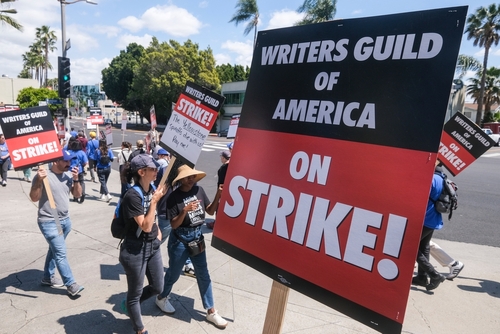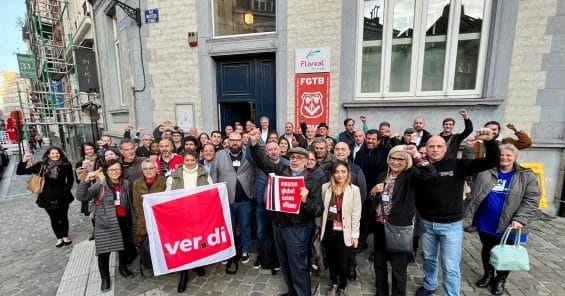Writers’ strike over, members to vote on historic deal
28.09.23
Next week, more than 11,000 members of UNI Global Union affiliates, Writers Guild of America, East and West, will vote on a groundbreaking new agreement with the Alliance of Motion Picture and Television Producers (AMPTP). The tentative agreement ends a near five-month long strike. It includes pioneering protections on the use of Generative AI, establishes minimum staffing levels for TV productions, and provides significant increases in remuneration, including new mechanisms which address the impacts of streaming.
“We can say, with great pride, that this deal is exceptional—with meaningful gains and protections for writers in every sector of the membership,” the guilds said in a joint letter to members. “What we have won in this contract is due to the willingness of this membership to exercise its power, to demonstrate its solidarity, to walk side-by-side, to endure the pain and uncertainty of the past 146 days. It is the leverage generated by your strike, in concert with the extraordinary support of our union siblings, that finally brought the companies back to the table to make a deal.”
One of the most hotly contested issues at the negotiating table was the use of Generative AI (GAI) and its implications for writers’ job and income security in the future. The writer’s compensation, writer’s credit and other rights will not be diminished by the use of the GAI text, which will not be considered “source material” or “literary material” for purposes of compensation and credits. The new provisions allow for both the writers and the companies to use AI as a supportive tool within the negotiated boundaries. If the company provides a writer with written material produced by GAI to be used as a basis for writing literary material (such as a script), the writer must first be put on notice that the material provided was produced by GAI. Writers can use AI as a tool, with company consent, but the company cannot require the writer to use AI software (such as ChatGPT) when performing writing services.
Other gains include increases in foreign-based residuals for streaming services, linked to the number of global subscribers, as well as a bonus structure for highly successful streaming shows. The streamers have agreed to increase transparency with respect to viewership, something that they had fiercely resisted in the past. In order to address the realities of fewer episodes in a streaming world, there will be staffing minimums for the writing rooms together with a guaranteed number of weeks of pay. The contract also includes minimum staffing and additional pay terms for “development rooms”, which have been increasingly prevalent in the streaming world. The deal also allows for increases in annual minimum pay and contributions to the unions’ health fund.
“The writers’ victory is inspiring. The employers in AMPTP are some of the most powerful corporations in the world, but the gains in this agreement show solidarity is stronger,” said Christy Hoffman, UNI General Secretary. “This agreement is proof that when technologies like generative AI are collectively bargained, workers can protect employment, improve conditions and continue to innovate. We hope that the AMPTP has learned this lesson as it enters into the next round of negotiations with SAG-AFTRA.”
The tentative agreement comes after an outstanding show of resilience and determination from writers, who have been on the picket lines day after day, as well as unprecedented solidarity from unions across the entertainment industry, in the U.S. and abroad. Both the WGA and SAG-AFTRA were at UNI’s 6th World Congress in Philadelphia last month, where they received support and solidarity from unions across the globe.


